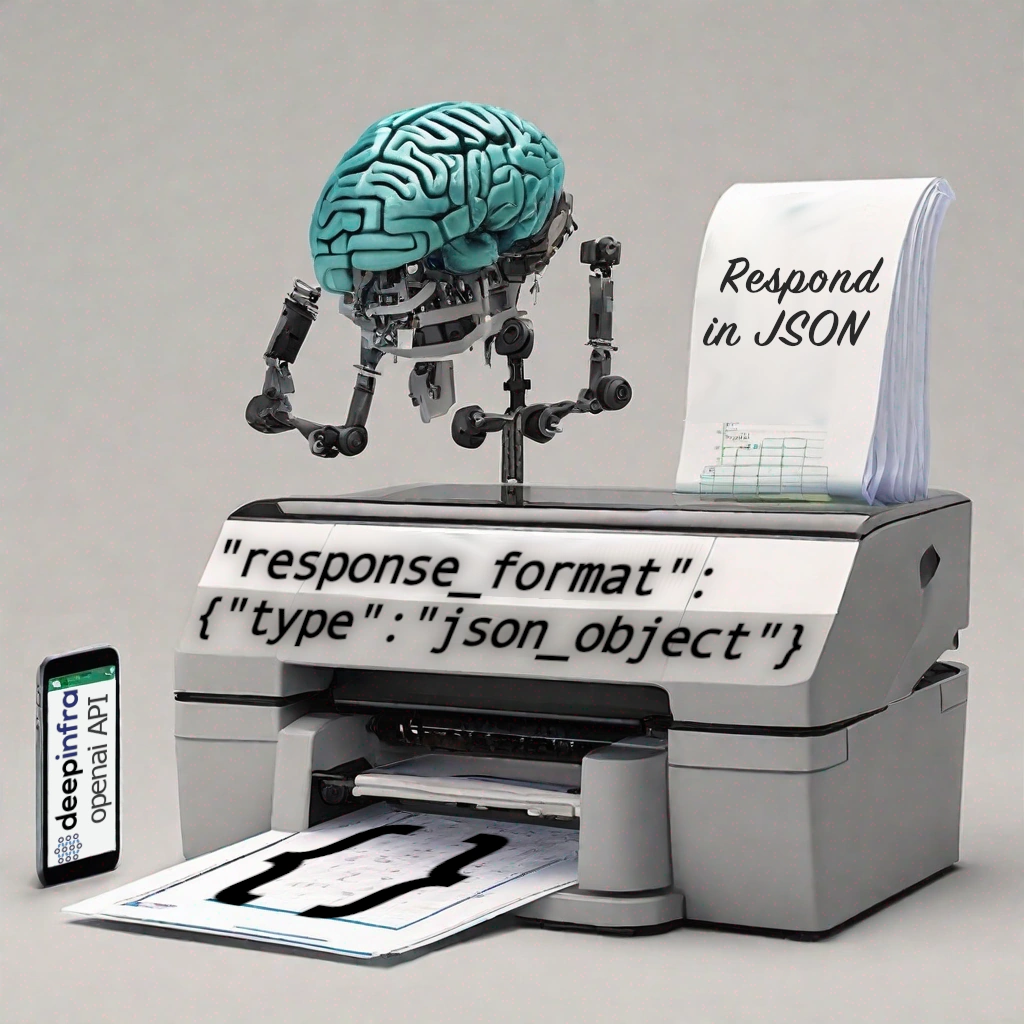Qwen3-Max-Thinking state-of-the-art reasoning model at your fingertips!

DeepInfra is proud to announce that we have released "JSON mode" across all of our text language models. It is available through the "response_format" object, which currently supports only {"type": "json_object"}
Our JSON mode will guarantee that all tokens returned in the output of a language model completion or chat response conforms to valid JSON (JavaScript Object Notation).
The JSON format carries no performance overhead, and the feature is already available on all of our models for free. Please try it out!
Using JSON mode
Activating a JSON response in any of deepinfra's text APIs, including /v1/inference, /v1/openai/completions and /v1/openai/chat/completions is performed in the same way: adding a parameter response_format and setting its value to {"type": "json_object"}
For the best quality responses, it is also recommended to prompt the model to produce JSON, perhaps also indicating which fields to include in the resulting object.
Example of JSON mode
Here is an example of using the openai chat API to invoke a model with JSON mode:
messages = [
{
"role": "user",
"content": "Provide a JSON list of 3 famous scientific breakthroughs in the past century, all of the countries which contributed, and in what year."
}
]
response = client.chat.completions.create(
model="mistralai/Mistral-7B-Instruct-v0.1",
messages=messages,
response_format={"type":"json_object"},
tool_choice="auto",
)
The resulting response.choices[0].message.content will contain a string with JSON:
{
"breakthroughs": [
{
"name": "Penicillin",
"country": "UK",
"year": 1928
},
{
"name": "The Double Helix Structure of DNA",
"country": "US",
"year": 1953
},
{
"name": "Artificial Heart",
"country": "US",
"year": 2008
}
]
}
Why JSON?
JSON is an ideal fit for language models due to the combination of its concise structure and the flexability of structured data that can be stored inside. Language models will pick up on the fact that JSON is being output and structure their output, often producing more data-driven responses with less tokens wasted on unwanted explanations or fluff.
JSON support will also open the door to more reliable function calling. Expect to see more improvements as we continue to iterate on this capability.
Like every aspect of inference, it is not without its tradeoffs.
Pros:
- Jumps straight to the desired information, skipping boilerplate text. Expect meaningful output within the first 10 tokens.
- Responses will be very data oriented, ideal for things like dates or lists.
Cons:
- No text before or after the JSON response: models are unlikely to explain their reasoning.
- JSON formatted responses have a greater tedency to make up information if a question is asked which the model cannot possibly know.
Conclusion
We're excited to finally launch JSON output to our platform. Read our JSON Mode Documentation.
There is still a lot unexplored, and we'd love to hear feedback about your thoughts and use-cases with JSON or other structured output. Join our Discord, Twitter for future updates.
Have fun!
 How to use CivitAI LoRAs: 5-Minute AI Guide to Stunning Double Exposure ArtLearn how to create mesmerizing double exposure art in minutes using AI. This guide shows you how to set up a LoRA model from CivitAI and create stunning artistic compositions that blend multiple images into dreamlike masterpieces.
How to use CivitAI LoRAs: 5-Minute AI Guide to Stunning Double Exposure ArtLearn how to create mesmerizing double exposure art in minutes using AI. This guide shows you how to set up a LoRA model from CivitAI and create stunning artistic compositions that blend multiple images into dreamlike masterpieces. Qwen API Pricing Guide 2026: Max Performance on a Budget<p>If you have been following the AI leaderboards lately, you have likely noticed a new name constantly trading blows with GPT-4o and Claude 3.5 Sonnet: Qwen. Developed by Alibaba Cloud, the Qwen model family (specifically Qwen 2.5 and Qwen 3) has exploded in popularity for one simple reason: unbeatable price-to-performance. In 2025, Qwen is widely […]</p>
Qwen API Pricing Guide 2026: Max Performance on a Budget<p>If you have been following the AI leaderboards lately, you have likely noticed a new name constantly trading blows with GPT-4o and Claude 3.5 Sonnet: Qwen. Developed by Alibaba Cloud, the Qwen model family (specifically Qwen 2.5 and Qwen 3) has exploded in popularity for one simple reason: unbeatable price-to-performance. In 2025, Qwen is widely […]</p>
 Chat with books using DeepInfra and LlamaIndexAs DeepInfra, we are excited to announce our integration with LlamaIndex.
LlamaIndex is a powerful library that allows you to index and search documents
using various language models and embeddings. In this blog post, we will show
you how to chat with books using DeepInfra and LlamaIndex.
We will ...
Chat with books using DeepInfra and LlamaIndexAs DeepInfra, we are excited to announce our integration with LlamaIndex.
LlamaIndex is a powerful library that allows you to index and search documents
using various language models and embeddings. In this blog post, we will show
you how to chat with books using DeepInfra and LlamaIndex.
We will ...
© 2026 Deep Infra. All rights reserved.

